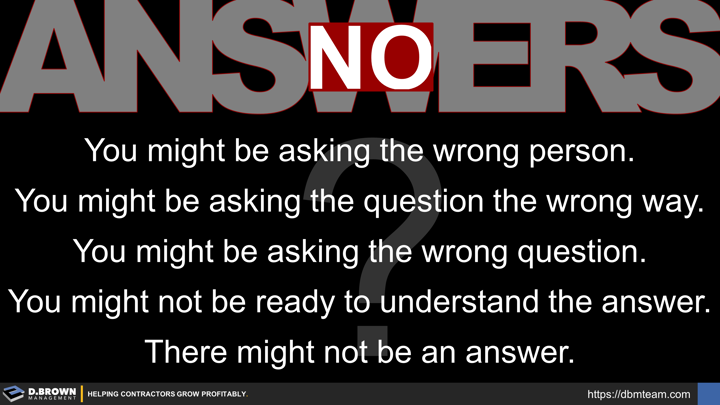This list is for the more complex and nuanced answers that really matter. Obviously if you are asking a simple question like "Where's the bathroom?" this list hopefully doesn't apply.
- You might be asking the wrong person. Consider working to triangulate by starting with developing a list of up to five people who you believe have the right experience and intent to provide you with a good answer. Some of the best researchers describe that they often get similar answers when asking four or less "experts" on a subject but on average when they get to the fifth or sixth person, they start to get divergent thinking which can be incredibly valuable when making decisions.
- You might be asking the question the wrong way - see the 8-Step Checklist for Good Questions.
- You might be asking the wrong question. For example, asking a "How can this work?" question instead of a "Should this be done at all?" question. These are usually where people get caught up in constructability vs. value-engineering at the project level or when working to manage with finite resources at the company or career level.
- You might not be ready to understand the answer. To understand something requires a combination of experience to provide context for the answer, complexity of thought to process that answer within the context, and an awareness of the cognitive biases we all have.
- There might not be an answer. Some complex questions simply don't have answers and many more don't have comfortable answers.
"Make things as simple as possible, but no simpler." - Einstein
Be especially aware of people who are providing simple and likable answers to complex and difficult questions. Lose 30 pounds in 30 days without working out....
- This may be wisdom and experience being able to see the simplicity from a higher level which is why enabling hierarchies are critical.
- This may be a total lack of their understanding and experience, which is why it is important to choose who you ask the questions to.
- This may be bad intentions designed to get you to take an action including buying something.
Additional Resources
- Smarter Faster Better: The Secrets of Being Productive in Life and Business
- How Minds Change: The Surprising Science of Belief, Opinion, and Persuasion
- You Are Now Less Dumb: How to Conquer Mob Mentality, How to Buy Happiness, and All the Other Ways to Outsmart Yourself

